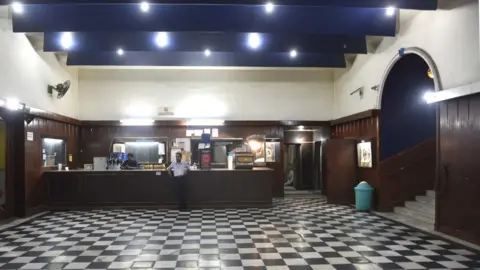Nikita YadavBBC News, Delhi
 Getty Images
Getty ImagesSahil Arora, 20, had been eagerly waiting to watch the latest Bollywood release starring his favourite actor.
But going to the theatre set him back considerably – a seat at a Delhi multiplex cost 500 rupees ($6; £4), nearly a third of his weekly pocket money.
“I enjoyed the movie, but the price was a sore point,” he said. “Popcorn was another 500 rupees, so I skipped it.”
He’s not alone. Rising ticket and snack prices mean moviegoers are cutting down on their trips to cinema and moving towards cheaper streaming options.
Harsh Verma, 38, looks back on a time when going to the movies didn’t feel like a luxury.
“Some 15 years ago, my friends and I would go and watch every new release, sometimes every week. That has now become impossible.”
In the past five years, data shows that the average cost of a film ticket in India has risen by 47%.
The Average Ticket Price (ATP) in 2020 was 91 rupees, while in 2024 it rose to 134, according to audience research firm Ormax media. However, between 2023 and 2024 there was only a 3% rise in the ATP – suggesting that the prices have stabilised.
The report adds that footfall in Indian cinemas has reduced by 6% in 2024 as compared to 2023, continuing a trend in recent years.
One of the main reasons why going to movies has become expensive is because single-screen theatres that offered cheaper tickets have now been mostly replaced by plush multi-screen cinemas that offer a host of amenities.
But multiplex owners argue that ticket prices are reasonable and that audiences continue to visit in large numbers.
 Bloomberg via Getty Images
Bloomberg via Getty ImagesSanjeev Kumar Bijli, executive director of multiplex chain PVR INOX Limited which owns more than 1,500 screens across India, told the BBC that the perception that people have stopped going to theatres is “a general notion squeezed in without fact-checking”.
He says his chain has recorded a footfall of 151 million in 2024, up from 140 million in 2023 and the numbers have been promising for this year as well.
Mr Bijli acknowledges receiving some feedback about high ticket prices, but says that audiences continue to turn up because they get “value for money” – provided a film is good.
“People walk out after three hours feeling satisfied, they’ve enjoyed themselves in air-conditioned comfort, with superior sound and an immersive experience.”
Mr Bijli says many chains like his are using flexible pricing and weekday offers to attract audiences – for instance, tickets at PVR cost only 92 rupees on Tuesdays.
Some Indian states have, however, also placed a cap on ticket prices, sparking a debate on whether this needs to be a nationwide regulation.
Mr Bijli argues that price caps don’t help them, as steady revenue is vital to maintain and upgrade facilities.
Film critic Komal Nahta believes that while lower prices could attract more audiences, owners must retain the freedom to keep their businesses profitable.
But, he adds that ticket rates shouldn’t be so high that the masses are priced out. “After all, it’s the people who make the stars,” he says.
 Hindustan Times via Getty Images
Hindustan Times via Getty ImagesMeanwhile, experts says that even though single screens offer cheaper tickets, many urban middle-class audiences no longer choose them because they cannot match the comfort and amenities of multiplexes.
“It’s a vicious cycle,” says Nahta. “Because footfalls are low, cinema owners can’t afford proper maintenance. And since the theatres aren’t well maintained, people don’t want to watch movies there.”
In Delhi, only a handful of single screens still stand. The rest have either shut down or fallen into disrepair, their ageing structures and outdated facilities a reminder of a bygone era.
Some patrons, however, remember single screens as simpler, more community spaces.
“There would be 800 to 1,000 people packed in together,” recalls 61-year-old Renu Bhushan. “The crowd would erupt when the star appeared on screen while vendors sold cheap snacks and drinks.”
But this nostalgia is not shared by everyone.
Mr Verma, says after visiting both single screens and multiplexes over the past two decades, he prefers the latter. “The seats [at single screens] are uncomfortable and the experience isn’t great,” he says.
Annu Gupta also prefers multiplexes because they offer better facilities, clean toilets and security.
Industry experts say theatres are also facing competition from cheaper streaming options which boomed during the Covid-19 pandemic. As audiences kept away, many theatres went out of business.
“With affordable subscriptions, people now watch most big releases within six-to-eight weeks at their homes,” says film trade expert and marketing analyst Girish Wankhede.
A monthly subscription to a streaming platform costs less than two tickets in a multiplex. For families, the math is even clearer.
But Mr Bijli of PVR says that with the pandemic a distant memory now, the audience behaviour is shifting again and people are returning to theatres.
Cinema and streaming are meant to co-exist and this isn’t the first time the industry has faced existential questions, he says.
“Cinema has faced challenges from TV, VHS and DVDs. Every time a new content medium emerged, people wrote off cinema, but it survived.
“It offers an immersive, uninterrupted experience that you simply can’t get at home.”
Follow BBC News India on Instagram, YouTube, X and Facebook.



